2026届高考英语二轮复习:状语从句复习 课件(共48张PPT)
文档属性
| 名称 | 2026届高考英语二轮复习:状语从句复习 课件(共48张PPT) |  | |
| 格式 | pptx | ||
| 文件大小 | 3.4MB | ||
| 资源类型 | 教案 | ||
| 版本资源 | 通用版 | ||
| 科目 | 英语 | ||
| 更新时间 | 2025-06-19 09:45:38 | ||
图片预览

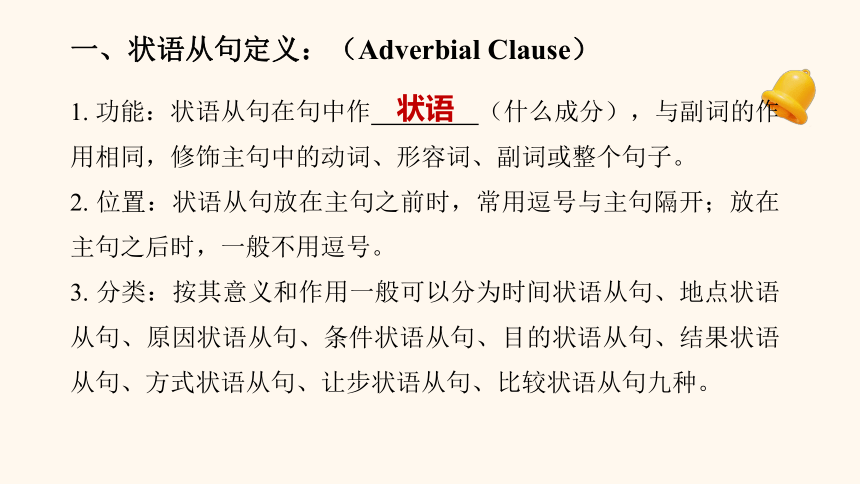

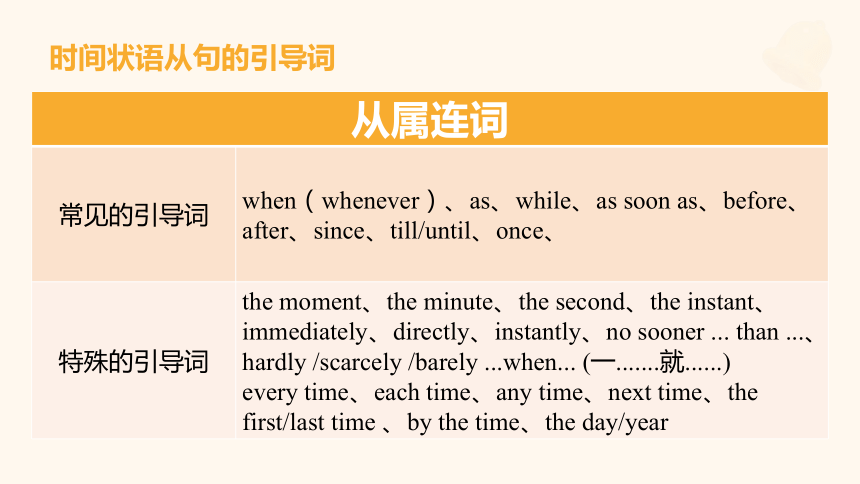
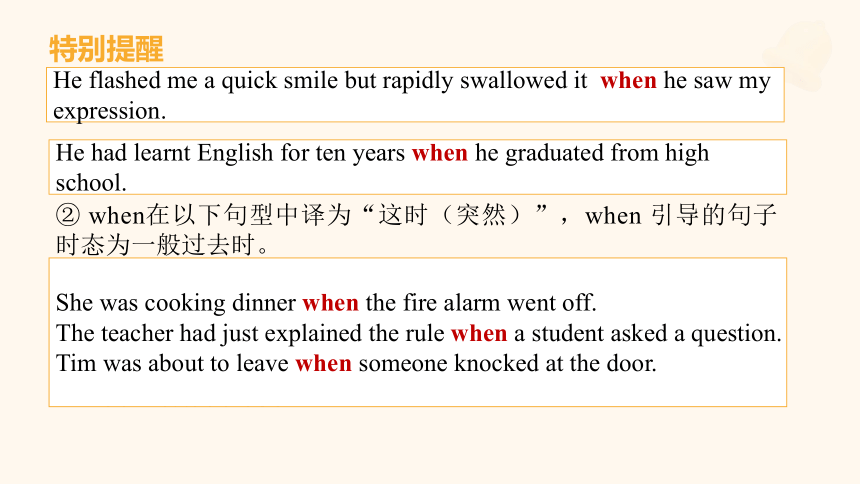
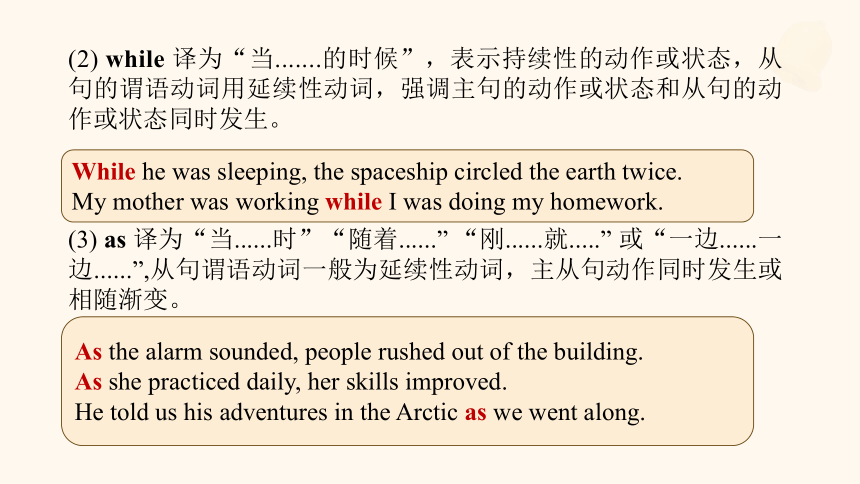
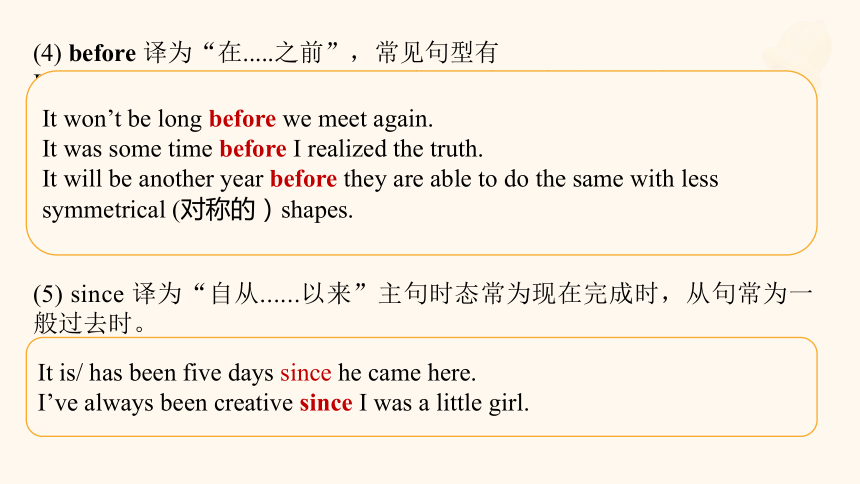
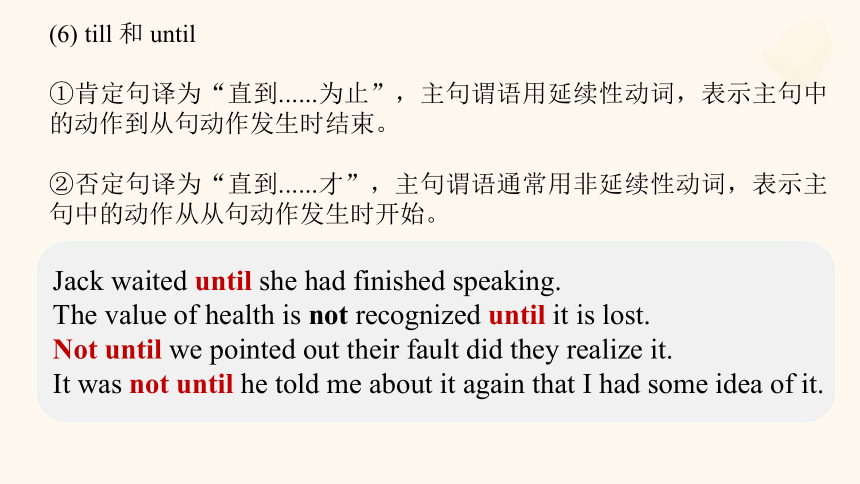
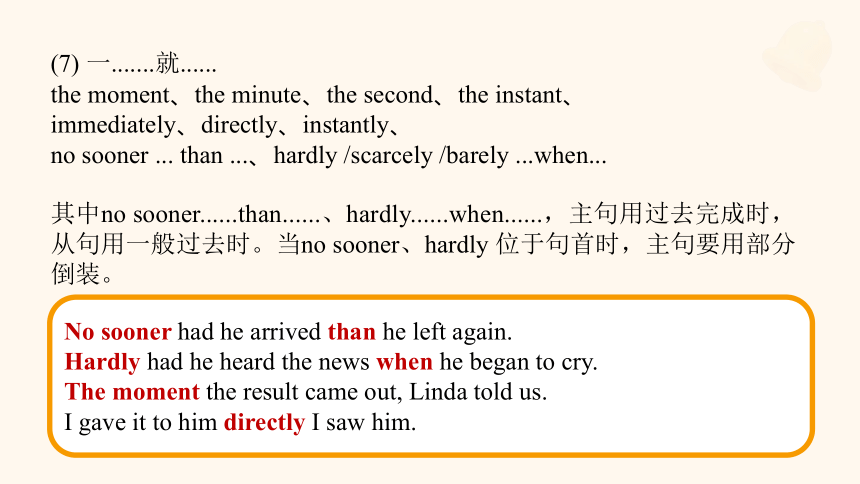
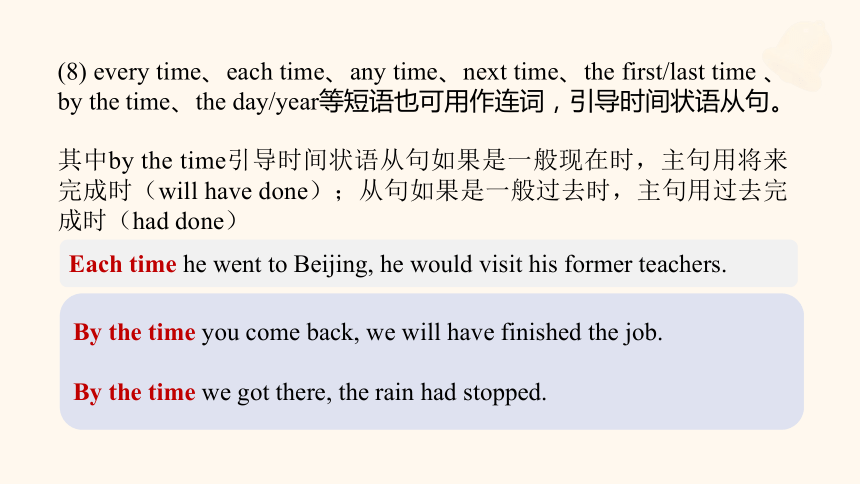
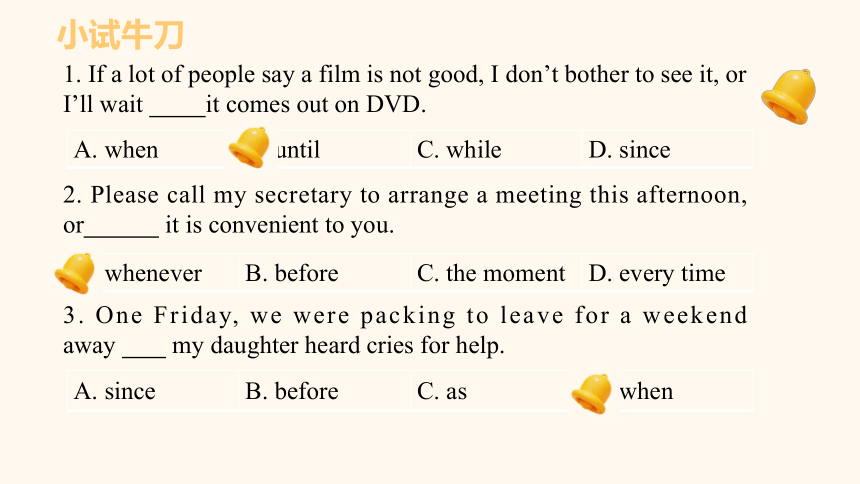
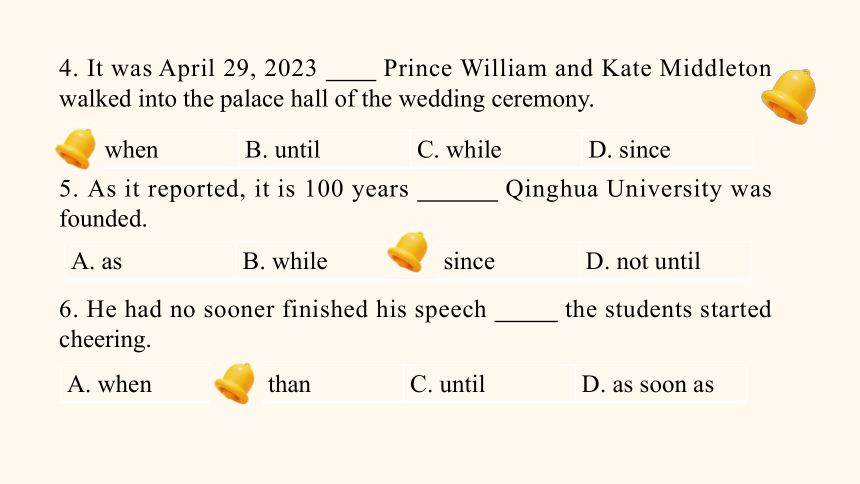
文档简介
(共48张PPT)
Overview of adverbial clauses
状语从句复习
一、状语从句定义:(Adverbial Clause)
1. 功能:状语从句在句中作 (什么成分),与副词的作用相同,修饰主句中的动词、形容词、副词或整个句子。
2. 位置:状语从句放在主句之前时,常用逗号与主句隔开;放在主句之后时,一般不用逗号。
3. 分类:按其意义和作用一般可以分为时间状语从句、地点状语从句、原因状语从句、条件状语从句、目的状语从句、结果状语从句、方式状语从句、让步状语从句、比较状语从句九种。
状语
时间状语从句
01
时间状语从句的引导词
从属连词
常见的引导词
when(whenever)、as、while、as soon as、before、after、since、till/until、once、
特殊的引导词 the moment、the minute、the second、the instant、
immediately、directly、instantly、no sooner ... than ...、
hardly /scarcely /barely ...when... (一.......就......)
every time、each time、any time、next time、the first/last time 、by the time、the day/year
特别提醒
(1) when 当......时
① 过去完成时常有when 引导的时间状语作为标志。
② when在以下句型中译为“这时(突然)”,when 引导的句子时态为一般过去时。
be doing.......when..... 某个动作正在发生,另一动作同时发生。
had (just) done.......when....... 某个动作刚刚发生,另一动作同时发生。
be about to do/ be on the point of doing.......when...... 某个动作将要发生,另一动作同时发生。
He flashed me a quick smile but rapidly swallowed it when he saw my expression.
He had learnt English for ten years when he graduated from high school.
She was cooking dinner when the fire alarm went off.
The teacher had just explained the rule when a student asked a question.
Tim was about to leave when someone knocked at the door.
(2) while 译为“当.......的时候”,表示持续性的动作或状态,从句的谓语动词用延续性动词,强调主句的动作或状态和从句的动作或状态同时发生。
(3) as 译为“当......时”“随着......” “刚......就.....” 或“一边......一边......”,从句谓语动词一般为延续性动词,主从句动作同时发生或相随渐变。
While he was sleeping, the spaceship circled the earth twice.
My mother was working while I was doing my homework.
As the alarm sounded, people rushed out of the building.
As she practiced daily, her skills improved.
He told us his adventures in the Arctic as we went along.
(4) before 译为“在.....之前”,常见句型有
It will be + 一段时间 + before...(从句用一般现在时) 要过......(时间)才......
It won’t be + 一段时间 + before...(从句用一般现在时)过不了......(时间)就.....
It was + 一段时间 + before...(从句用一般过去时)过了.......(时间)才......
(5) since 译为“自从......以来”主句时态常为现在完成时,从句常为一般过去时。
It is / has been + 一段时间 + since...(从句用一般过去时) 自......以来已经有......(时间)了。
It won’t be long before we meet again.
It was some time before I realized the truth.
It will be another year before they are able to do the same with less symmetrical (对称的)shapes.
It is/ has been five days since he came here.
I’ve always been creative since I was a little girl.
(6) till 和 until
①肯定句译为“直到......为止”,主句谓语用延续性动词,表示主句中的动作到从句动作发生时结束。
②否定句译为“直到......才”,主句谓语通常用非延续性动词,表示主句中的动作从从句动作发生时开始。
till不可以置于句首,而until 可以置于句首。
如果将“not until”放在句首,那么主句要用部分倒装结构。
not until 可用于强调句型,而till不用于强调句型。
Jack waited until she had finished speaking.
The value of health is not recognized until it is lost.
Not until we pointed out their fault did they realize it.
It was not until he told me about it again that I had some idea of it.
(7) 一.......就......
the moment、the minute、the second、the instant、
immediately、directly、instantly、
no sooner ... than ...、hardly /scarcely /barely ...when...
其中no sooner......than......、hardly......when......,主句用过去完成时,从句用一般过去时。当no sooner、hardly 位于句首时,主句要用部分倒装。
No sooner had he arrived than he left again.
Hardly had he heard the news when he began to cry.
The moment the result came out, Linda told us.
I gave it to him directly I saw him.
(8) every time、each time、any time、next time、the first/last time 、by the time、the day/year等短语也可用作连词,引导时间状语从句。
其中by the time引导时间状语从句如果是一般现在时,主句用将来完成时(will have done);从句如果是一般过去时,主句用过去完成时(had done)
By the time you come back, we will have finished the job.
By the time we got there, the rain had stopped.
Each time he went to Beijing, he would visit his former teachers.
1. If a lot of people say a film is not good, I don’t bother to see it, or I’ll wait it comes out on DVD.
2. Please call my secretary to arrange a meeting this afternoon, or it is convenient to you.
3. One Friday, we were packing to leave for a weekend away my daughter heard cries for help.
小试牛刀
A. when B. until C. while D. since
A. whenever B. before C. the moment D. every time
A. since B. before C. as D. when
4. It was April 29, 2023 Prince William and Kate Middleton walked into the palace hall of the wedding ceremony.
5. As it reported, it is 100 years Qinghua University was founded.
6. He had no sooner finished his speech the students started cheering.
A. when B. until C. while D. since
A. as B. while C. since D. not until
A. when B. than C. until D. as soon as
7. John thinks it won’t be long he is ready for his new job.
8. It was not widely accepted as a travel concept the late 1980s.
9. the damage is done, it will take many years for the farmland to recover.
A. once B. before C. since D. when
A. Since B. Once C. While D. When
A. immediately B. until C. as D. when
地点状语从句
02
地点状语从句的引导词
where、wherever
where 引导的地点状语从句用于直接说明主句动作发生的场所位置,其核心功能是描述空间场景而非修饰名词。
Where there is a will, there is a way. 有志者,事竟成。
You can go where you want to go. 你可以去你想去的地方。
Wherever there is political unheaval, invariably there are refugees.
1. Today, we will begin we stopped yesterday so that no point will be left out.
2. The little girl who got lost decided to remain she was and wait for her mother.
3. You’d better not leave the medicine kids can get at it.
4. If you are travelling the customs are really foreign to your own, please do as the Romans do.
where
where
where
where
原因状语从句
03
原因状语从句的引导词
从属连词
常见的引导词 because、since、as、
特殊的引导词
now (that)、in that、given that、seeing that、considering (that)
特别提醒
① because 表示直接原因,语气最强。
I believe it’s the right thing to do because it gives everyone a fair chance. 我认为这么做是正确的,因为这给予每个人公平的会。
② since 引导的原因状语从句一般置于主句之前,表示已知的、显然的理由(通常被翻译成"既然"),较为正式,语气比because弱。
Since it is raining outside, we shall not go to the park.
由于外面正在下雨,我们不会去公园了。
③ as 引导原因状语从句时表示附带说明双方已知的原因,语气比since弱。
Education has always been a hot topic among parents as it is directly related to the future of their children.
教育一直是家长之间的热门话题,因为它直接关系到他们孩子的未来
④ seeing that, now that, in that, given that, considering(that),表示“鉴于,由于,既然”。
Now that we have got the good news, let’s go and celebrate it.
我们既然已经得到了那个好消息,就让我们去庆祝一下吧。
Considering (that) everybody is here, let’s begin our discussion.
既然大家都到了,我们就开始讨论吧。
for和上述从属连词不同,它是一个并列连词,连接的是并列句。for 连接的句子并不是主句行为发生的直接原因,只是提供一些辅助性的补充说明或表示推测。for 连接的句子一般位于句末,并且通常用逗号隔开。
We should be more careful, for it is already dark.
我们应更小心些,因为天已经黑了
条件状语从句
04
条件状语从句的引导词
从属连词
常见的引导词 if 、unless(除非) 、once(一旦)
特殊的引导词
as/so long as(只要)、only if(只有)、
providing /provided(that) (如果)、supposing (that)(假如)、in case(假使、万一)、on condition that (在......条件下)
特别提醒
only if 引导的条件状语从句位于句首的时候,主句会用部分倒装结构。
Only if you have persistence can you achieve success.
只有坚持不懈,你才能取得成功。
目的状语从句
05
目的状语从句引导词
从属连词
常见的引导词 so that(以便、以至于)、in order that(目的是)
特殊的引导词
for fear that(以免、以防)、in the hope that(希望......)、
in case(以免、以防)
特别提醒
① so that 引导目的状语从句一般置于主句之后。
② in order that 引导的让步状语从句可放在主句之前,也可放在主句之后。
③ 目的状语从句的谓语常含有may 、might、can、could、will、would等情态动词。
结果状语从句
06
结果状语从句的引导词
so......that.......、such......that......
特别提醒
① so......that......
so + 形容词/副词 + that....
so + 形容词 +a/an + 可数名词单数 + that....
so + many /few + 可数名词复数 + that....
so + much /little + 不可数名词 + that....
特别提醒
② such.......that......
such + a/an + 形容词 + 可数名词单数 + that....
such + 形容词 + 可数名词复数 + that....
such + 形容词 + 不可数名词 + that....
③ 有时为了表示强调,可把so 或 such 置于句首,此时主句要用部分倒装。
So bright was the moon that the flowers were as bright as they were by day.
在如此明亮的月光下,花儿就像在白天一样鲜艳。
方式状语从句
07
方式状语从句的引导词
as 、as if、as though
特别提醒
① as 意为“如同,按照......的方式”,引导的方式状语从句常位于主句之后。
② as if / as though 意为“仿佛,好像”,引导方式状语从句多用虚拟语气,表示与现在情况相反的假设时从句谓语用一般过去时,表示与过去情况相反的假设时从句谓语用过去完成时;有时也用陈述语气,表示所说情况是事实或实现的可能性较大。
特别提醒
I remember the whole thing as if it happened yesterday.
此情此景,犹如发生在昨天,我记忆犹新。(与现在事实相反)
The injured man acted as if nothing had happened to him.
这个受伤的男人行动起来好像他身上什么都没发生过似的。(与过去事实相反)
It looks as if the weather may pick up very soon.
看来天气可能很快就会好起来。(实现的可能性较大)
让步状语从句
08
让步状语从句引导词
从属连词
常见的引导词 although、though、as、while 、even if、even though
特殊的引导词
“疑问词 + ever” : whatever、whichever、whoever、wherever、whenever、however
“no matter + 疑问词”:no matter what/ which /who /where /when /how
特别提醒
① although 和 though 不可以与 but 连用,但可以与still、yet、nevertheless 等连用。
② though引导让步状语从句时可用倒装结构也可不用,倒装时要把从句中作表语的名词或形容词、作状语的副词或作谓语的实义动词提前。作表语的可数名词单数位于句首时,名词前不加冠词;as引导让步状语从句时要用倒装结构;although不能用倒装结构。
Successful as he is, he is not proud. 他虽成功了,但不骄傲。
③ while引导让步状语从句时通常位于句首。
特别提醒
④ “疑问词 +ever ”引导让步状语从句时,可与“no matter + 疑问词”互换。(注意:只有“疑问词 +ever ”可以引导名词性从句)
No matter what / Whatever you do, do it well. 无论你做什么,做好它。
⑤ even if /even though 引导让步状语从句时,可用虚拟语气,也可用陈述语气。
Even if I were busy, I would go. 即使我很忙,我也会去。(现在实际不忙)
He will come on time even though / if it rains. 即使下雨,他也会准时来。
比较状语从句
09
比较状语从句的引导词
as 、than
特别提醒
① as........as....肯定句 / not so (as).......as....否定句,第一个as是副词,为“如此”的意思,在主句中说明所比内容的程度;第二个as可看作连词,引导从句。
He works as hard as his brother does. 他学习和他哥哥一样努力。
The work is not so difficult as you imagine. 这工作不像你想象的那么困难。
② than 意为“比”
You look younger than you are. 你看起来比你实际上要年轻。
特别提醒
比较状语从句的谓语动词如果与主句的谓语动词一致,且为行为动词时,常用do (does,did) 代替,以免重复。
We have produced more coal this year than we did last year,
我们今年生产的煤要比去年生产的多。
She drives better than her husband does. 她车开得比她丈夫好。
状语从句省略
10
特别提醒
在表示时间、条件、让步等的状语从句中,如果从句的主语和主句的主语相同或从句的主语是it,从句的谓语又含有be的某种形式时,可以省略从句中的主语和be 动词,从而构成”从属连词+形容词/现在分词/过去分词/名词/介词短语/不定式"结构。
If (it is) possible, please look up the word in the dictionary.
如果可能的话,请在词典里查阅那个单词。
特别提醒
He is a good man, though sometimes (he is) rather dull.
他是个好人,尽管有时很愚钝。
While (I was) passing by the supermarket, I met my friend.
路过超市时,我遇见了我的朋友。
Unless (I am) invited, I won’t take part in the activity.
除非有人邀请,否则我不会参加那个活动。
状语从句练习
11
1. Children should be instructed to put things ________ they belong in the early childhood.
2. Strange ________ it might sound, his idea was accepted by all the people at the meeting.
3. I have a tight budget for the trip, so I'm not going to fly ________ the airlines lower ticket prices.
4. ________ safety always comes first, please queue up in lines to enter the hall orderly and do not push each other.
where
As
unless
as
5. If a lot of people say a film is not good, I won't bother to see it, or I'll wait ________ it comes out on the Internet.
6. I'm sorry you have been waiting so long, but it will still be some time ________ you can get your passport.
7. She was looking for her bicycle key ________ she thought she might have put it.
8. ________ he asked the villagers on the banks of the river where he could find the legendary artist, they smiled and pointed down the river.
until
wherever
before
When/ As
9. ________ birds use their feathers for flight, some of their feathers are for other purposes.
10. The fear is that ________ we don't start taking the litter out of the sky soon, it will become a significant threat to active satellites.
11. The games my parents taught me ________ I was a child turned out to be very useful later in my life.
12. Tom is so independent that he never asks his parents' opinion ________ he wants their support.
Although
unless
when
if
THANKS
Overview of adverbial clauses
状语从句复习
一、状语从句定义:(Adverbial Clause)
1. 功能:状语从句在句中作 (什么成分),与副词的作用相同,修饰主句中的动词、形容词、副词或整个句子。
2. 位置:状语从句放在主句之前时,常用逗号与主句隔开;放在主句之后时,一般不用逗号。
3. 分类:按其意义和作用一般可以分为时间状语从句、地点状语从句、原因状语从句、条件状语从句、目的状语从句、结果状语从句、方式状语从句、让步状语从句、比较状语从句九种。
状语
时间状语从句
01
时间状语从句的引导词
从属连词
常见的引导词
when(whenever)、as、while、as soon as、before、after、since、till/until、once、
特殊的引导词 the moment、the minute、the second、the instant、
immediately、directly、instantly、no sooner ... than ...、
hardly /scarcely /barely ...when... (一.......就......)
every time、each time、any time、next time、the first/last time 、by the time、the day/year
特别提醒
(1) when 当......时
① 过去完成时常有when 引导的时间状语作为标志。
② when在以下句型中译为“这时(突然)”,when 引导的句子时态为一般过去时。
be doing.......when..... 某个动作正在发生,另一动作同时发生。
had (just) done.......when....... 某个动作刚刚发生,另一动作同时发生。
be about to do/ be on the point of doing.......when...... 某个动作将要发生,另一动作同时发生。
He flashed me a quick smile but rapidly swallowed it when he saw my expression.
He had learnt English for ten years when he graduated from high school.
She was cooking dinner when the fire alarm went off.
The teacher had just explained the rule when a student asked a question.
Tim was about to leave when someone knocked at the door.
(2) while 译为“当.......的时候”,表示持续性的动作或状态,从句的谓语动词用延续性动词,强调主句的动作或状态和从句的动作或状态同时发生。
(3) as 译为“当......时”“随着......” “刚......就.....” 或“一边......一边......”,从句谓语动词一般为延续性动词,主从句动作同时发生或相随渐变。
While he was sleeping, the spaceship circled the earth twice.
My mother was working while I was doing my homework.
As the alarm sounded, people rushed out of the building.
As she practiced daily, her skills improved.
He told us his adventures in the Arctic as we went along.
(4) before 译为“在.....之前”,常见句型有
It will be + 一段时间 + before...(从句用一般现在时) 要过......(时间)才......
It won’t be + 一段时间 + before...(从句用一般现在时)过不了......(时间)就.....
It was + 一段时间 + before...(从句用一般过去时)过了.......(时间)才......
(5) since 译为“自从......以来”主句时态常为现在完成时,从句常为一般过去时。
It is / has been + 一段时间 + since...(从句用一般过去时) 自......以来已经有......(时间)了。
It won’t be long before we meet again.
It was some time before I realized the truth.
It will be another year before they are able to do the same with less symmetrical (对称的)shapes.
It is/ has been five days since he came here.
I’ve always been creative since I was a little girl.
(6) till 和 until
①肯定句译为“直到......为止”,主句谓语用延续性动词,表示主句中的动作到从句动作发生时结束。
②否定句译为“直到......才”,主句谓语通常用非延续性动词,表示主句中的动作从从句动作发生时开始。
till不可以置于句首,而until 可以置于句首。
如果将“not until”放在句首,那么主句要用部分倒装结构。
not until 可用于强调句型,而till不用于强调句型。
Jack waited until she had finished speaking.
The value of health is not recognized until it is lost.
Not until we pointed out their fault did they realize it.
It was not until he told me about it again that I had some idea of it.
(7) 一.......就......
the moment、the minute、the second、the instant、
immediately、directly、instantly、
no sooner ... than ...、hardly /scarcely /barely ...when...
其中no sooner......than......、hardly......when......,主句用过去完成时,从句用一般过去时。当no sooner、hardly 位于句首时,主句要用部分倒装。
No sooner had he arrived than he left again.
Hardly had he heard the news when he began to cry.
The moment the result came out, Linda told us.
I gave it to him directly I saw him.
(8) every time、each time、any time、next time、the first/last time 、by the time、the day/year等短语也可用作连词,引导时间状语从句。
其中by the time引导时间状语从句如果是一般现在时,主句用将来完成时(will have done);从句如果是一般过去时,主句用过去完成时(had done)
By the time you come back, we will have finished the job.
By the time we got there, the rain had stopped.
Each time he went to Beijing, he would visit his former teachers.
1. If a lot of people say a film is not good, I don’t bother to see it, or I’ll wait it comes out on DVD.
2. Please call my secretary to arrange a meeting this afternoon, or it is convenient to you.
3. One Friday, we were packing to leave for a weekend away my daughter heard cries for help.
小试牛刀
A. when B. until C. while D. since
A. whenever B. before C. the moment D. every time
A. since B. before C. as D. when
4. It was April 29, 2023 Prince William and Kate Middleton walked into the palace hall of the wedding ceremony.
5. As it reported, it is 100 years Qinghua University was founded.
6. He had no sooner finished his speech the students started cheering.
A. when B. until C. while D. since
A. as B. while C. since D. not until
A. when B. than C. until D. as soon as
7. John thinks it won’t be long he is ready for his new job.
8. It was not widely accepted as a travel concept the late 1980s.
9. the damage is done, it will take many years for the farmland to recover.
A. once B. before C. since D. when
A. Since B. Once C. While D. When
A. immediately B. until C. as D. when
地点状语从句
02
地点状语从句的引导词
where、wherever
where 引导的地点状语从句用于直接说明主句动作发生的场所位置,其核心功能是描述空间场景而非修饰名词。
Where there is a will, there is a way. 有志者,事竟成。
You can go where you want to go. 你可以去你想去的地方。
Wherever there is political unheaval, invariably there are refugees.
1. Today, we will begin we stopped yesterday so that no point will be left out.
2. The little girl who got lost decided to remain she was and wait for her mother.
3. You’d better not leave the medicine kids can get at it.
4. If you are travelling the customs are really foreign to your own, please do as the Romans do.
where
where
where
where
原因状语从句
03
原因状语从句的引导词
从属连词
常见的引导词 because、since、as、
特殊的引导词
now (that)、in that、given that、seeing that、considering (that)
特别提醒
① because 表示直接原因,语气最强。
I believe it’s the right thing to do because it gives everyone a fair chance. 我认为这么做是正确的,因为这给予每个人公平的会。
② since 引导的原因状语从句一般置于主句之前,表示已知的、显然的理由(通常被翻译成"既然"),较为正式,语气比because弱。
Since it is raining outside, we shall not go to the park.
由于外面正在下雨,我们不会去公园了。
③ as 引导原因状语从句时表示附带说明双方已知的原因,语气比since弱。
Education has always been a hot topic among parents as it is directly related to the future of their children.
教育一直是家长之间的热门话题,因为它直接关系到他们孩子的未来
④ seeing that, now that, in that, given that, considering(that),表示“鉴于,由于,既然”。
Now that we have got the good news, let’s go and celebrate it.
我们既然已经得到了那个好消息,就让我们去庆祝一下吧。
Considering (that) everybody is here, let’s begin our discussion.
既然大家都到了,我们就开始讨论吧。
for和上述从属连词不同,它是一个并列连词,连接的是并列句。for 连接的句子并不是主句行为发生的直接原因,只是提供一些辅助性的补充说明或表示推测。for 连接的句子一般位于句末,并且通常用逗号隔开。
We should be more careful, for it is already dark.
我们应更小心些,因为天已经黑了
条件状语从句
04
条件状语从句的引导词
从属连词
常见的引导词 if 、unless(除非) 、once(一旦)
特殊的引导词
as/so long as(只要)、only if(只有)、
providing /provided(that) (如果)、supposing (that)(假如)、in case(假使、万一)、on condition that (在......条件下)
特别提醒
only if 引导的条件状语从句位于句首的时候,主句会用部分倒装结构。
Only if you have persistence can you achieve success.
只有坚持不懈,你才能取得成功。
目的状语从句
05
目的状语从句引导词
从属连词
常见的引导词 so that(以便、以至于)、in order that(目的是)
特殊的引导词
for fear that(以免、以防)、in the hope that(希望......)、
in case(以免、以防)
特别提醒
① so that 引导目的状语从句一般置于主句之后。
② in order that 引导的让步状语从句可放在主句之前,也可放在主句之后。
③ 目的状语从句的谓语常含有may 、might、can、could、will、would等情态动词。
结果状语从句
06
结果状语从句的引导词
so......that.......、such......that......
特别提醒
① so......that......
so + 形容词/副词 + that....
so + 形容词 +a/an + 可数名词单数 + that....
so + many /few + 可数名词复数 + that....
so + much /little + 不可数名词 + that....
特别提醒
② such.......that......
such + a/an + 形容词 + 可数名词单数 + that....
such + 形容词 + 可数名词复数 + that....
such + 形容词 + 不可数名词 + that....
③ 有时为了表示强调,可把so 或 such 置于句首,此时主句要用部分倒装。
So bright was the moon that the flowers were as bright as they were by day.
在如此明亮的月光下,花儿就像在白天一样鲜艳。
方式状语从句
07
方式状语从句的引导词
as 、as if、as though
特别提醒
① as 意为“如同,按照......的方式”,引导的方式状语从句常位于主句之后。
② as if / as though 意为“仿佛,好像”,引导方式状语从句多用虚拟语气,表示与现在情况相反的假设时从句谓语用一般过去时,表示与过去情况相反的假设时从句谓语用过去完成时;有时也用陈述语气,表示所说情况是事实或实现的可能性较大。
特别提醒
I remember the whole thing as if it happened yesterday.
此情此景,犹如发生在昨天,我记忆犹新。(与现在事实相反)
The injured man acted as if nothing had happened to him.
这个受伤的男人行动起来好像他身上什么都没发生过似的。(与过去事实相反)
It looks as if the weather may pick up very soon.
看来天气可能很快就会好起来。(实现的可能性较大)
让步状语从句
08
让步状语从句引导词
从属连词
常见的引导词 although、though、as、while 、even if、even though
特殊的引导词
“疑问词 + ever” : whatever、whichever、whoever、wherever、whenever、however
“no matter + 疑问词”:no matter what/ which /who /where /when /how
特别提醒
① although 和 though 不可以与 but 连用,但可以与still、yet、nevertheless 等连用。
② though引导让步状语从句时可用倒装结构也可不用,倒装时要把从句中作表语的名词或形容词、作状语的副词或作谓语的实义动词提前。作表语的可数名词单数位于句首时,名词前不加冠词;as引导让步状语从句时要用倒装结构;although不能用倒装结构。
Successful as he is, he is not proud. 他虽成功了,但不骄傲。
③ while引导让步状语从句时通常位于句首。
特别提醒
④ “疑问词 +ever ”引导让步状语从句时,可与“no matter + 疑问词”互换。(注意:只有“疑问词 +ever ”可以引导名词性从句)
No matter what / Whatever you do, do it well. 无论你做什么,做好它。
⑤ even if /even though 引导让步状语从句时,可用虚拟语气,也可用陈述语气。
Even if I were busy, I would go. 即使我很忙,我也会去。(现在实际不忙)
He will come on time even though / if it rains. 即使下雨,他也会准时来。
比较状语从句
09
比较状语从句的引导词
as 、than
特别提醒
① as........as....肯定句 / not so (as).......as....否定句,第一个as是副词,为“如此”的意思,在主句中说明所比内容的程度;第二个as可看作连词,引导从句。
He works as hard as his brother does. 他学习和他哥哥一样努力。
The work is not so difficult as you imagine. 这工作不像你想象的那么困难。
② than 意为“比”
You look younger than you are. 你看起来比你实际上要年轻。
特别提醒
比较状语从句的谓语动词如果与主句的谓语动词一致,且为行为动词时,常用do (does,did) 代替,以免重复。
We have produced more coal this year than we did last year,
我们今年生产的煤要比去年生产的多。
She drives better than her husband does. 她车开得比她丈夫好。
状语从句省略
10
特别提醒
在表示时间、条件、让步等的状语从句中,如果从句的主语和主句的主语相同或从句的主语是it,从句的谓语又含有be的某种形式时,可以省略从句中的主语和be 动词,从而构成”从属连词+形容词/现在分词/过去分词/名词/介词短语/不定式"结构。
If (it is) possible, please look up the word in the dictionary.
如果可能的话,请在词典里查阅那个单词。
特别提醒
He is a good man, though sometimes (he is) rather dull.
他是个好人,尽管有时很愚钝。
While (I was) passing by the supermarket, I met my friend.
路过超市时,我遇见了我的朋友。
Unless (I am) invited, I won’t take part in the activity.
除非有人邀请,否则我不会参加那个活动。
状语从句练习
11
1. Children should be instructed to put things ________ they belong in the early childhood.
2. Strange ________ it might sound, his idea was accepted by all the people at the meeting.
3. I have a tight budget for the trip, so I'm not going to fly ________ the airlines lower ticket prices.
4. ________ safety always comes first, please queue up in lines to enter the hall orderly and do not push each other.
where
As
unless
as
5. If a lot of people say a film is not good, I won't bother to see it, or I'll wait ________ it comes out on the Internet.
6. I'm sorry you have been waiting so long, but it will still be some time ________ you can get your passport.
7. She was looking for her bicycle key ________ she thought she might have put it.
8. ________ he asked the villagers on the banks of the river where he could find the legendary artist, they smiled and pointed down the river.
until
wherever
before
When/ As
9. ________ birds use their feathers for flight, some of their feathers are for other purposes.
10. The fear is that ________ we don't start taking the litter out of the sky soon, it will become a significant threat to active satellites.
11. The games my parents taught me ________ I was a child turned out to be very useful later in my life.
12. Tom is so independent that he never asks his parents' opinion ________ he wants their support.
Although
unless
when
if
THANKS
